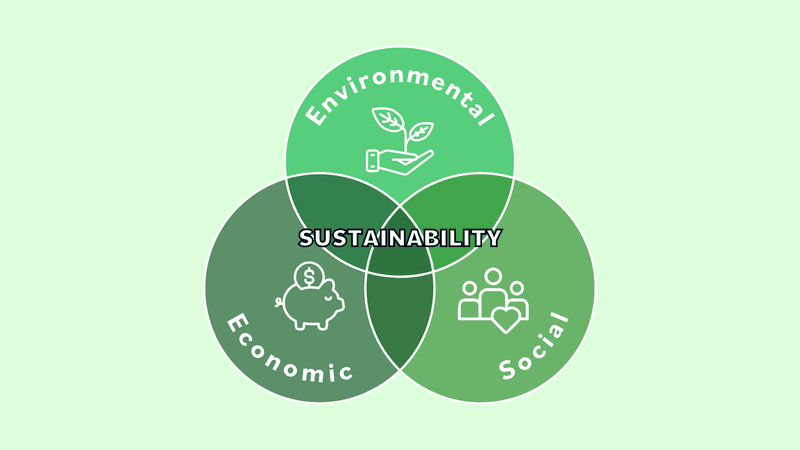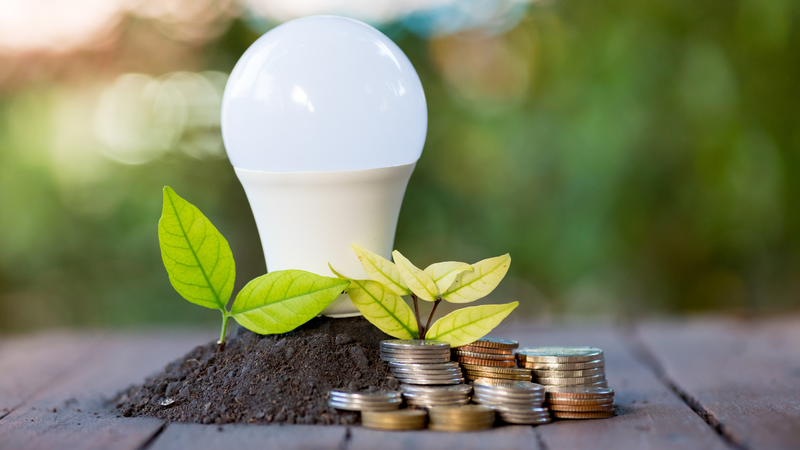With more and more restaurants introducing vegan options, supermarkets swapping their plastic bags for paper ones, and cosmetic brands improving their packaging and using recycled materials, sustainability might seem like a trend everyone’s trying to jump on. But is it really a trend? Or is it something that every person and every business should actually care about? Is it something that should become the new normal?
Well, let’s find out!

What is sustainability?
We can’t talk about sustainability and why you should care about it without explaining what it actually means.
According to Cambridge Dictionary, sustainability is “the quality of causing little or no damage to the environment and therefore able to continue for a long time”.
However, sustainability isn’t all about the environment.
The idea of sustainability is often broken down into three pillars: environmental, economic and social. Informally, they can also be called planet, profits and people.
Environmental sustainability
Environmental sustainability focuses on the well-being of the environment and making sure that a business makes as little damage as possible. This could include recycling, reusing materials when possible, going paperless, investing in higher-efficiency appliances etc.
Social sustainability
Social sustainability can be achieved both internally and externally.
Internally, companies focus on their employees by creating a positive work environment where people are treated fairly, have the opportunity to express themselves, access mental health support and are encouraged to learn and develop themselves both personally and professionally. Investing in the well-being of the employees also leads to economic benefits for the company as people are more motivated and are more likely to stay in the same company for longer.
Externally, social sustainability can be achieved by supporting local communities. For example, by sponsoring education funds for youth or donating part of your profits to a local charity.
Economic sustainability
Economic sustainability refers to practices that support the long-term economic growth of a company while also protecting the environmental, social, and cultural elements of the community.
As you have probably noticed, all three pillars are very closely related. So even if you make one change such as reducing the waste your business produce, you not only help the environment but also save on costs associated with that waste and boost your employee morale by making them proud to work at a company that cares!

Benefits of sustainability in business
As mentioned earlier, sustainability isn’t only about the environment.
Here are just a few reasons why introducing sustainable practices in your business is a great idea!
Sustainable businesses meet their customers’ expectations better
A study has found that 4 in 5 people are more likely to buy from a brand with a positive approach to environmental sustainability.
Most of the time consumers look for sustainable options when choosing food, clothes, household items or home appliances. And the fact that there are more and more people looking for those sustainable options means that if you want to make sure your business stays attractive to your customers, you need to make some changes! And it’s best to do it sooner rather than later to stay ahead of the competition.
Sustainability can make your business more attractive to investors
Companies that follow sustainable practices and know how to manage ESG (Environmental, Social & Governance) risks are usually more profitable and can survive in difficult circumstances as they are resilient against volatility. This makes them more attractive to investors.
Investors and banks are starting to favour strong environmental and sustainability performance, which means that sustainable businesses can get more investments and cheaper insurance.

Introducing sustainable practices now prepares your business for the future
Both international organisations and the UK Government realise the impact businesses can have on the environment. That’s why they are always looking for solutions and ways to reduce it by implementing new laws and regulations.
For example, the UK is currently moving towards a low-carbon green economy. The regulations coming through in upcoming years will no doubt put added pressure on businesses to rethink their environmental obligations.
So why not start thinking about how you can become more sustainable now and prepare your business for the future?
Lower costs and higher profits
There are many changes businesses can make to not only embrace sustainability but also save money AND increase profits.
These days, we are all worried about rising energy prices and are looking for ways to reduce those bills.
This can be done in a few simple ways:
- Invest in energy-efficient appliances – this can be pricey but will save you money in the long run.
- Take advantage of natural light. If that’s not an option for you, use LED lights that use less energy than incandescent light bulbs and last longer.
- Unplug electronics at night. Most devices still use energy even when the power is off!
Even better, by lowering your energy consumption you not only reduce your bills but also do good for the planet by reducing your carbon footprint!
Another thing you can do is switch to more durable materials. Again, initially, this can cost more. But it will help you save money in the long term.
For example, when you invest in higher-quality materials and reuse them whenever possible, you also reduce costs associated with waste and energy consumption.
“But how about those increased profits?” you might ask. The answer is simple. When you implement sustainable practices into your business and make sure your potential and existing customers know about them, they are more likely to buy from you as well as spread the word about your business. As mentioned earlier, consumers want to support environmentally friendly businesses!

People want to work for sustainable companies
Last but not least, implementing sustainability in your business can help you attract and retain talent.
When looking for a new job, people consider things such as responsibilities, salary, location and… whether the company is sustainable!
The survey conducted by IBM has found that 71% of job seekers want to work for environmentally sustainable companies.
Also, among the respondents who changed jobs in the past year, one in three said that they accepted a lower salary to work for a sustainable or socially responsible organisation.
However, it’s important to remember that this doesn’t mean that you should offer a lower salary just because your business is sustainable! But if you are a small business that doesn’t have a big budget, you still have a chance to attract great employees if you share the same values and care about the environment and the impact your business can have on future generations.
How to implement sustainability into your business?
When you decide that it’s time to make a change in your business, remember, those changes require time – nothing happens overnight!
You need to create a plan, communicate with your team, suppliers and customers and make it one step at a time. The fact that you want to change your business and reduce your impact on the environment is already a big win!
While we have given a few tips on how to become more sustainable in this blog post, there are many more things you can and should do!
To help you learn everything you need to know to become a sustainable business, we deliver the Innovation Green course.
From this course you will:
- Develop methods to make your business economically, environmentally and socially sustainable
- Develop an understanding of climate change, sustainability and environmental protection
- Acknowledge the roles that business and industry play in protecting the environment
- Reduce your business’s environmental impact by more efficient use of resources

